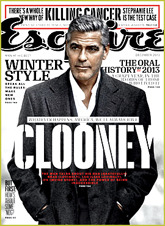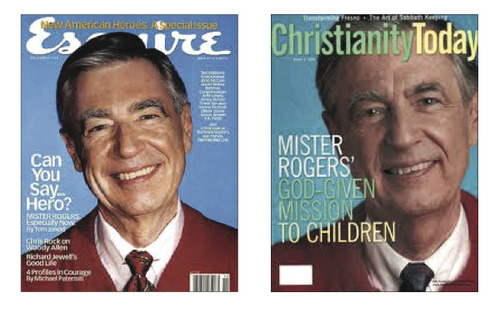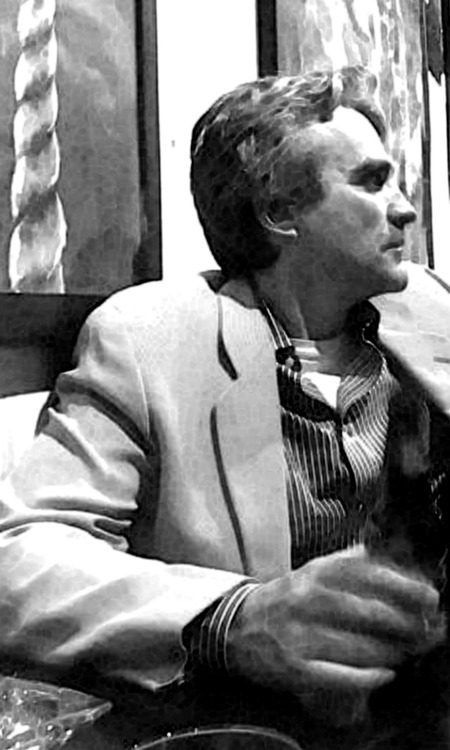By Wendy Murray
(This piece appeared first on Tumblr, in a blog that has been deleted.)
Tom Junod’s Esquire cover story (Dec.) on George Clooney created a buzz, not because it was by Tom Junod, but because of what Clooney said about Russell Crowe and Twitter, among other things. When the buzz commenced, before seeing the piece, I knew instantly that 1. if it was a cover story on Clooney and 2. in Esquire — and 3. that it was buzzing — it was written by Tom Junod.
Our careers intersected years ago in the person of Fred (Mister) Rogers. Writing a piece about Fred was where we both went as journalists when we needed some reorientation or recalibrating of who we are.
Fred said to me repeatedly during that assignment, “Oh Wendy, do call Tom. He is such a wonderful man.” Fred Rogers died in 2003. Tom and I both felt the loss deeply. Fred brought us together as friends and colleagues who speak truth to each other. (There is no place else to go when your starting point is Mister Rogers.)
I spoke with Tom at length not long ago for a book I am writing. It was a compelling and intimate conversation that reveals that, behind the Clooney buzz, he is a writer with a profound sense of his humanity.
I include a few glimpses of that conversation below:
On his father [whom he likens to “Don Draper” of Mad Men]
I couldn’t watch certain TV shows. I couldn’t watch The Monkees or The Flying Nun. His problem with The Flying Nun was that he thought it was sacreligious, even though he was a heathen and never went to church. And his problem with The Monkees was that [when] he used to go to night clubs in New York City, El Morocco and Copacabana — he was big on that world; he lived like a wannabe star and wannabe gangster at the same time — he had heard in his travels that one of the Monkees was gay. I was 8 or something and I wasn’t allowed to watch The Monkees because one of them apparently was a homosexual.
On journalism & an oddly disorienting childhood
The journalists that I like the most have that in common. The guys that I know the best are the Esquire guys, the crowd of guys I came up with. All of us have a lot of that in common. We kind of stumbled our way into it. I value those voices more than I value than the people who are trying to make journalism one-of-the-professions crowd.
On William Faulkner
Faulkner’s writing was like the-whole-word-in-a-sentence kind of thing. He would write these endless sentences, marching up and down with words I didn’t know (I had to look them up in a dictionary). The whole idea of putting a world in a sentence seemed to appeal to me right away. And it still does.
When I started reading literature I found people who finally had their say in ways that were consummate and unimpeachable and complete.
That is still part of me as a writer. I tend to write long. I tend to write in paragraphs rather than in sentences. That desire to have my say has been with me since I was a kid. Journalism allowed me that and I’m happy for it.
On Fred ‘Mister’ Rogers [The assignment came in the bruising aftermath of the publication of a piece Tom had written a controversial piece about Kevin Spacey]
There was an editor at Esquire that had the idea of me doing a piece on Mister Rogers based on the logic: Wouldn’t it be funny for Tom, the bad boy now, this take-no-prisoners guy, to go and interview Mister Rogers?
Then I went in and saw Fred. And Fred, in his way, decided to trust me in a open way and strategic way, in a way that let me know that he knew that I needed to be trusted. Fred Rogers had a way of looking at people — it was a minister’s way of looking at people — knowing what they needed. And Fred trusted me. I wrote about that when I wrote about Fred.
I had come to a difficult moment in my career. I was really having trouble writing and figuring out what was expected of me — was I supposed to be the good guy? Was I supposed to be the bad guy? Am I wearing black? Am I wearing white? All this extra-journalistic stuff or non-journalistic stuff was entering into my journalism. Then Fred came along and offered me this trust. It was an amazing experience.
A moment of grace
I was not looking for a moment of grace. I came in there thinking, Isn’t this funny that Tom, the guy who can tear the skin off of somebody’s back, is going to do a piece on gentle Fred?
I spent a lot of time with Fred. Bill Eisler [Fred’s agent] and I were driving to Fred’s hometown of Latrobe the day we went to Fred’s parents’ graveside. On the way down Bill said:
‘You know what’s happening here, don’t you?’
I said, ‘no.’
He said, ‘Fred’s interested in you spiritually.’
I said, ‘Really?’
He said, ‘Do you really think Fred spends time like this with people? Fred doesn’t do anything he doesn’t want to do.’
Under that gentle voice is a man of steel. Bill was very clear about that. Fred does not do anything he does not want to do.
Fred definitely had a spiritual agenda that I did not have. I have had moments of desperation as a writer and I was desperate about writing at that time. Writing doesn’t come easily to me. When things are working I can write well and I can write long. But when they aren’t I am practically illiterate.
I’ve been trying to move towards being honest with people and having a human experience with people. It’s such a large part of the job. To have people trust you and believe is a profound thing. The fact that I’ve become friendly with certain people that I’ve written about is important to me. It never used to be. I used to be kind of a scorched-earth person. I think that is a younger man’s game. As you get older you realize that it is not worth having somebody call you a liar or having somebody say you betrayed his trust. It is very damaging to me and damning to me.
In my piece about Fred I talk about the umbrella opening in my heart [when he prayed]. It was a spiritual moment. But it was also a writing moment. I had a piece that I had to do for Esquire that I was completely jammed on; I couldn’t write it. When I felt my heart open like an umbrella, I knew in that moment that I was going to be able to go back to my hotel room and finish that piece. I felt that certain burdens were lifted.




No comments:
Post a Comment